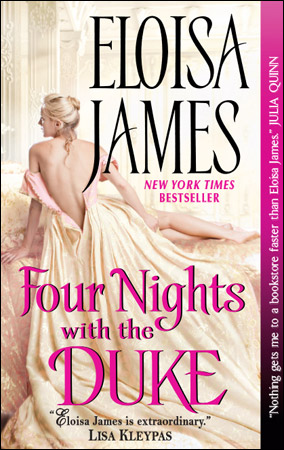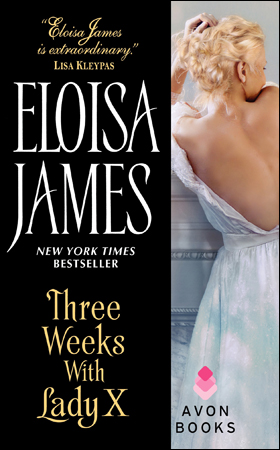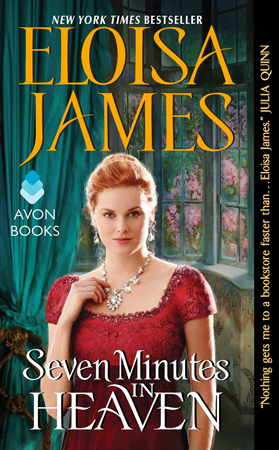Four Nights with the Duke
Book 2 in the 9-to-5, Duchess Style! Series
As a young girl, Emilia Gwendolyn Carrington told the annoying future Duke of Pindar that she would marry any man in the world before him—so years later she is horrified to realize that she has nowhere else to turn.
Evander Septimus Brody has his own reasons for agreeing to Mia’s audacious proposal, but there’s one thing he won’t give his inconvenient wife: himself. Instead, he offers Mia a devil’s bargain… he will spend four nights a year with her.
Four nights, and nothing more. And those only when she begs for them. Which Mia will never do.
Now Vander faces the most crucial challenge of his life: he must seduce his own wife in order to win her heart—and no matter what it takes, this is the one battle he can’t afford to lose.

Four Nights with the Duke
Book Extras

Inside Four Nights with the Duke
Four Nights with the Duke follows Three Weeks with Lady X, the tale of Thorn and India, who also appear in this novel. From the moment Vander told Thorn, in Three Weeks, that he wanted the type of marriage that the Duke of Villiers had, I knew that he would be the best kind of hero—the alpha who is intently anti-romantic, but can’t stop himself from falling deeply in love.

Four Nights with the Duke Deleted Scene
This scene would have appeared after the Prologue. I left it out because pacing demanded that the novel go straight from Mia’s defiant cry that she will never marry Vander to the moment when she’s climbing the steps to his house, about to blackmail him into marriage. I hope you enjoy! ~Eloisa

A Second Deleted Scene from Four Nights with the Duke
Enjoy a visit with India and Thorn, the main characters from Three Weeks with Lady X, who make an appearance in Four Weeks. My editor said this scene had to be cut because India and Thorn were stealing the show from Mia and Vander! ~Eloisa
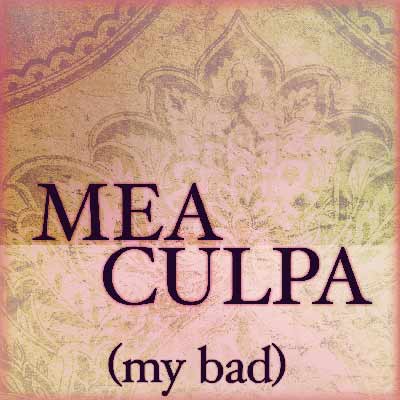
Mea Culpa, Four Nights with the Duke
More than one reader wrote to tell me that at one point in Four Nights Mia’s notes about her heroine mistake Flora for “Florida.” While I routinely try out five or six names for each of my main characters, Mia wouldn’t dream of naming one of her characters after a place that didn’t even gain statehood until 1845. (This has been corrected in the electronic version and will disappear from future print versions as well.)
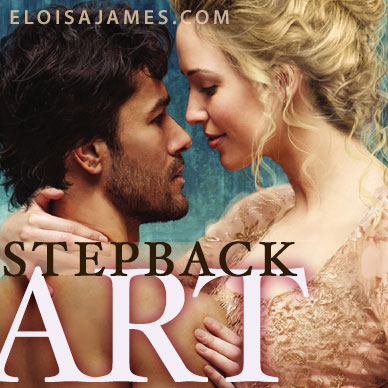
Stepback for Four Nights with the Duke
Enjoy the stepback for Four Nights with the Duke.

Eloisa’s Four Nights Original eCards
Eloisa loves to play around in Photoshop with her covers, especially around book release time! She creates lots of them, and always posts them to Facebook and other social networks.

Four Nights with the Duke
Reviews
"brilliantly executed", with a "flair for faultless plotting and flawless character development," and "sparkling wit".
— Booklist (starred review)
"Historical romance at its smart, poignant best."
— Kirkus (starred review)
"wit is sexy and romance is smart."
— RT BOOKClub (Top Pick!)
"Four Nights with the Duke is a delicious Regency romp you won't want to miss."
"Full of seduction and adventure, the characters jump off the page and into the readers' hearts."
Four Nights with the Duke
Enjoy an Excerpt
Jump to Ordering Options ↓
Listen to an Audio Excerpt ↓
Prologue 
- Jump to:
- Chapter One
- Chapter Two
- Chapter Three
Spring, 1787
A Music Recital
The Duke of Villiers’s townhouse
At fifteen, Emilia Gwendolyn Carrington already had a pretty good idea of what hell was like. Mia’s governess had taught her all about Dante’s nine infernal circles.
Mia’s first circle had required her to make her debut at fifteen, under the aegis of a hired chaperone, because her mother was dead. Her second circle had added a far worse indignity: her charming, widowed father was conducting a flagrant affaire with a married duchess that everyone in the fashionable world knew about.
She had entered the third circle over the last year or so, when against all reason, she had fallen desperately in love with the same duchess’ son, Vander. He was the most sensitive, intelligent boy in the world (or so Mia thought). And he was beautiful too, with a face that resembled the stone angels that guarded babies’ graves.
The remaining circles of hell? All six?
They were revealing themselves in rapid succession. Mia had begged her father to attend the Villiers’s musicale on the chance that the object of her adoration, Evander Septimus Brody, future Duke of Pindar, would be present. It seemed probable since the Duke of Villiers’s eldest son, Tobias, was best mates with Vander.
As it turned out, the house was indeed overrun with boys on holiday from Eton and among the horde was Vander, who roundly ignored her. Mia didn’t mind that: she was happy worshipping him from afar. He was too godlike for someone like her.
Besides, it wasn’t as if he danced attendance on any other girl. He and the other Etonians spent their time swigging brandy although it was not yet noon, cursing loudly, and generally pretending to be far older than their fifteen years. Mia finally retreated to the library, a tranquil room with book-lined walls.
She was searching the shelves for anything resembling her favorite novel, Eliza Heywood’s Love in Excess, when she heard, to her horror, the sound of boys approaching. Even worse, she quickly recognized the voices as those of Vander and his friend Tobias, who seemed to be calling himself Thorn these days.
The library was at the end of the corridor, so there was no escape.
Panicked, Mia dashed behind the sofa and slid down until she was entirely concealed.
It was only then that she truly understood that she had entered that final, innermost circle of hell.
The boys were discussing a love poem.
Not just any love poem, either.
They were puzzling over The Love Song of E. Septimus Brody—in other words, a poem addressed explicitly to Vander—that Mia herself had written. That she had poured her heart, her love, and her tears into.
It wasn’t very good; none of her poems were very good.
Still, it was her poem, and it was supposed to be safely in her desk back home. Not being bandied about at a musicale. And definitely not in the hands of the very boy she’d written it about.
Even in the midst of a wave of nausea, Mia guessed what had happened. Her father had found the poem and thought it would be amusing to share with his mistress, and his mistress had in turn shared it with her son. Mia had been such a fool to give it that title.
At least Vander wasn’t howling with laughter, probably because he couldn’t understand it. He and Thorn were hardly literary types, if a fifteen-year-old boy could be such a thing.
“Do you suppose the part about how moonbeams kiss the sea is some sort of innuendo?” Thorn asked.
Mia rolled her eyes. What an absurd suggestion. He probably still moved his lips when he read.
“I don’t think so,” Vander answered, rather uncertainly. “Let’s toss it in the fire. I don’t want anyone to see it.”
She had scarcely breathed a sigh of relief when there was a clatter of boots and a boy shouted, “I’ve been looking all over for you fellows. One of the Villiers twins just threw up from nerves. It stinks down there!”
“I can’t imagine why you were looking for us, Rotter,” Vander stated, sounding all of a sudden like a future duke. “We told you last week that we wanted nothing more to do with you.”
“Bloody hell, no need to be nasty,” the boy retorted, entirely unmoved by this set-down. “What have you got there?” To Mia’s horror, the question was followed by the sound of a scuffle and tearing paper.
If Dante had conceived of a tenth circle of hell, this was it. Francis Oakenrott was a boy as rotten as his name implied. She had met him twice, at house parties her father dragged her along to. It was a case of mutual loathing-at-first-sight.
“A love poem,” he shouted, clearly delighted. “Don’t tell me that you’ve taken up with an opera dancer with a literary bent. The headmaster will have your guts for garters.”
“Give me that,” Vander snarled.
But Oakenrott apparently evaded capture. “Blazing hell, this is utter rubbish!” He broke into an escalating, barking laugh. Another thump followed. “Oh, for God’s sake, back off and let me read it. It’s too late to keep your little secret now. You’d think you were ashamed.”
Mia pulled a sofa pillow over her face with a silent groan. She wanted to die, to fall into a crack in the floor.
“I am mad with love,” Oakenrott recited, in a squeaky falsetto. “You know, I could see this on the stage. Have you been hanging about the back door of Drury Lane?”
“She’s definitely cracked,” Thorn said. “Who could fancy a smelly, sweaty bloke like you?”
“You’re just jealous,” Vander retorted. “She’d have to be barmy to look in your direction. Or Rotter’s.”
“So who’s the madwoman?” Oakenrott said, paper rustling as he turned it over. “Emilia Carrington? You mean the daughter of your mother’s—”
“Don’t,” Vander warned, his voice suddenly dangerous.
There was a telling moment of silence. “Right. I’ll just go back to this literary masterpiece. No one understands my plight,” he read, his voice squealing even higher. “I like this part about the moonbeam kissing the sea. Obviously, you have the moonbeam, and she’s the sea.” He went into another barking cascade of guffaws. A sob rose up Mia’s chest, pressing so hard that pain shot through her breastbone.
“You’re such an ass,” Thorn said. “How old is that girl, anyway?”
“The same as me,” Vander replied. “Fifteen.”
“In my dreams, you married me,” Oakenrott said, reading from the beginning of the next stanza. A tear slid down Mia’s neck. “Your beauty makes me drunk.”
Oakenrott hooted. Vander groaned.
She heard a hearty slap and then Thorn said, “Look at it this way, at least you’ve managed to charm a girl who knows a thing or two about brandy.”
“Not as much as you do, after last night!” Vander retorted.
Likely they were all drunken sots. Mia’s governess had told her that boys pretending to be men drank far too much.
Oakenrott was relentless; he just wouldn’t shut up. “My room is full of moonlight, and your eyes are like pearls.” Do you suppose you’re being invited to take your pearly eyes into her moonlit room?”
“I’d have to grope my way,” Vander said, and Mia could hear the laughter in his voice. “Nobody could see through pearly eyes.”
Mia’s lips involuntarily shaped a curse word that she would never dare say aloud.
Oakenrott whistled. “Pearls? You know what kind of pearls she’s really talking about, right? Pearl drops! Pearly potions, like we used to call it back in first form. No—wasn’t it pearly passion potions? Something like that. Anyway, this is the first poem I’ve ever read that talked about love custard!”
Suddenly all three boys were laughing hysterically.
“Love custard”? Mia hadn’t the faintest idea what that meant, but she knew instinctively that it was something disgusting. Boys were disgusting by nature; she’d temporarily forgotten that while pining for Vander. When she thought he was god-like.
In reality he was a heartless pig.
“You haven’t gotten under her skirts, have you?” Oakenrott sounded gleeful at the prospect. “Her father could take this line about being lost in your sweetness and pressure you to make an offer.”
“Never!” Vander sounded so appalled that the word slid over Mia’s skin like a snake. “It’s a little odd to think that she’s been lusting after me. What sort of fifteen-year-old girl thinks in these terms? Though I suppose she is her father’s daughter.”
Mia could hardly breathe because she was trying to sob without noise. He made her sound repulsive, saying that she was lusting after him. It wasn’t like that. She wasn’t like that.
“Have you ever noticed her staring at you from the side of the room?” Thorn asked. “Because here it says, Like the bird that gazes all night at the moon, I gaze at you.”
“Like a bird, or a Bird of Paradise?” Oakenrott put in. “Maybe she can set herself up as a literary light-skirt. One sovereign for a poem and two for a you-know-what.”
“All I can say is she’s a God-awful poet,” Vander said. “Even I know that poems are supposed to rhyme.”
What an idiot. Mia took a shuddering breath. She had to escape. She simply could not stand any more of this.
“I think you should frame it,” Thorn said, “because I can tell you right now that no one else will think you’re pretty enough to rhapsodize about. Especially given the size of your moonbeam.”
That brought on a scuffle and more laughter. At her expense. Mia could feel the air rattling in her throat. Likely it was the death rattle. Maybe she would die, and they’d find her body in this very spot.
“You know, I have to warn the fellows,” Oakenrott said. “Some bloke might be chatting with her right now, having no idea what a jam tart she is.”
Mia stiffened.
“If she’s like that at fifteen, what’ll she be like at twenty?”
“Don’t even jest about it. You’d ruin her,” Thorn said sharply. “You mustn’t say a word.”
“The poetry is evidence for the obvious,” Oakenrott protested. “She’s got a sluttish look about her. It’s all there. Most girls that age have apple dumplings in front, but hers are more like cabbages than cherries!”
Cabbages? Cabbages?
Mia stifled another sob. There was silence for a second, just long enough so that Mia could imagine Vander standing up for her, like a knight in shining armor. Growling, Shut your mouth, Oakenrott. She does not look sluttish.
That didn’t happen.
“There’s no need to issue warnings,” Vander said flatly. “There isn’t a fellow in this house who would bother speaking to that dumpy little thing. The only reason she was invited was that my mother brought along her lover, who dragged along his daughter. She’s a charity case, that’s what she is.”
A charity case. A dumpy one, at that.
She loathed him even more because he was right: she was dumpy. Other girls were tall and willowy, but she was “petite,” which was just a pretentious way of saying that she was short.
And round. He meant she was fat.
He was a beast, a horrid beast.
Rage is a useful emotion. Rage burns away sorrow and disgrace. Rage propelled Mia to her feet, and she came out from around the sofa with her fists clenched.
Even knowing what he thought of her poem, despite her rage, the sight of Vander slammed into her. She had loved him too long to be unaffected by seeing him this close.
He was already tall and broad-shouldered. You could see the man he would someday be in the lineaments of his body and the strength of his jaw.
She looked at him up and down, curling her lip, and then gave his friends the same inspection.
Thorn looked horrified, and Oakenrott surprised, but Vander was utterly expressionless. All the things she’d thought she’d seen in him, every good characteristic that she had believed he had, the gentlemanly nature that seemed an antidote to her father’s indiscretions . . . well, she must have made those traits up. There was nothing readable in his face, and clearly she had seen whatever she longed to find.
“So,” she said, thankfully discovering that her voice was steady. “Three boys whose imaginations are so disgusting that they can read lechery into a silly love poem.” She snatched the crumpled page from Thorn’s hand and tore it in half. The sound seemed very loud in the otherwise silent room. She tore it again, and again, and dropped the pieces on the floor.
“I may have made a fool of myself by falling in love,” she told Vander, “but you have no right to ridicule me for it. Do you know that I was foolish enough to think you a gentleman, unlike—” She caught herself. Her father was her father, no matter his sins. “I should have known better,” she added. “You say I am my father’s daughter. Well, you, Lord Brody, are obviously your mother’s son.”
To her left, Thorn made a protesting movement but she swept him a glance and he shut his mouth.
Vander only stared at her. Why had she never noticed his beautiful eyes were hard and cold?
“I shall now take myself and my cabbages into the drawing room,” she said, head high, though it took every ounce of willpower she could summon to hold it there. “If you would do me the courtesy to remain here for fifteen minutes, I shall find my father and be gone.”
None of them said a word, the pestilent cowards.
One more thing occurred to her. “Moreover, I wouldn’t marry a single one of you,” she said, making her voice as scathing as she could, “even if I were desperate! Even if you were the only men left in all England!”

Chapter One 
- Jump to:
- Prologue
- Chapter Two
- Chapter Three
Thirteen years later
From the offices of Brandy, Bucknell & Bendal, Publishers August 27, 1800
Dear Miss Carrington,
I am writing to inquire about the prospect of receiving your new novel. As you know, we had hoped to receive the manuscript some six months ago. We are all most sympathetic as regards the tragic death of your father and brother a year ago. But I would be remiss not to tell you that letters begging for Miss Lucibella Delicosa’s next novel are piling up in our offices. Your title, An Angel’s Form and a Devil’s Heart, has proved so enticing that subscriptions already exceed sales of your last two novels added together.
With deep respect, and anticipating a favorable reply, I remain,
William Bucknell, Esq.
P.S. I am including Miss Julia Quiplet’s latest novel. I believe you said that you had not yet read her work, and we are persuaded that you will find it pleasurable.
September 4, 1800
Rutherford Park
The Duke of Pindar’s country estate
Mia hated to admit it, but she was trembling like one of her own heroines. She generally put her poor ladies in Mortal Danger, standing at the brink of icy waters, for example, pursued by a lustful landlord, knees knocking pitiably and delicate hands shaking.
Her readers expected Mortal Danger. In capital letters.
She’d happily choose a plunge over a waterfall to the humiliation that lay ahead of her.
Her own less-than-delicate hands were trembling, so she curled them into fists, watching as her groom announced her name. Vander’s butler—or, to be exact, the Duke of Pindar’s butler—glanced down at her, patently surprised that a young lady had arrived without a chaperone.
Did intense humiliation count as Mortal Danger?
No, because if it were possible to die of humiliation, she would surely be dead by now. After all, she had survived the mortifying poetry incident in Villiers’s library all those years ago, then she’d failed on the marriage market, only to go through an even worse humiliation: being jilted at the altar a month ago.
The truth was that as an author she was always kind to her characters. Mortal Danger never included jiltings. What’s more, thanks to her heroines’ thin, wispy bodies, they always floated safely downstream, too light to sink. She had never forced any of her heroines to propose marriage, let alone to a duke.
Gentlemen fell at her heroines’ feet, not the other way around. It was a strict requirement of the genre. Lord knows, Lucibella Delicosa disappointed her readers at her own peril: a torrent of indignant letters would pour through her publisher’s door if she were to shame one of her heroines the way Mia was about to be shamed.
But at least, Mia reminded herself, she was not, in reality, falling at Vander’s feet.
She was in charge.
In control.
Before she could think better of it, she took a deep breath, handed her pelisse to the butler, and marched past him into the morning room. Mia had spent a good deal of time in the ducal country estate as a young girl, given the late duchess’ decades-long affaire with her father, and she knew where she was headed.
Even though the principal players in that drama— her father and Vander’s mother—had passed away, it seemed nothing had changed in the manor house. Every horizontal surface was still crowded with animal figurines, evidence of the late duchess’ fascination with small creatures.
She turned to the butler. “Please let His Grace know that my call shall be quite brief.”
“I shall ascertain whether His Grace is receiving,” he said, and left.
Surely Vander would see her? How could he deny her, given their parents’ relationship? Commonsense reminded her that he might well deny her for that precise reason.
She wandered over to look at the glass menagerie that resided on the mantelpiece. The unicorn had lost his horn, but all the animals were still there, silently poised with a paw up or a tail waving—some with little animal families, as though they had paired off and multiplied while the house slept.
But she couldn’t concentrate on the little curl of glass, a tadpole, she picked up. The thought of what lay ahead of her—the marriage proposal—made her feel dizzy, as if her corset was constricting her chest and making it hard to breathe. Years before, when she’d vowed to Vander’s face never to marry him, a gleam of amusement had sprung to his eyes.
What if he burst out laughing now?
She was not exquisitely beautiful, refined, intelligent . . . and she didn’t even have a fortune. Who ever heard of a wallflower asking a duke for his hand in marriage?
Mia took another deep breath. She wasn’t precisely asking the duke to marry her. That would be pitiful. She was blackmailing him, which was altogether different.
More swashbuckling. More perilous.
More criminal.
She should pretend this wasn’t happening to her, but to one of her heroines, the way she did with almost everything else. She already had plenty of practice observing her life as if from outside. She regularly chatted with patently bored gentlemen, simultaneously rewriting the conversation in such a way that a fantastically idealized version of herself left them dumbstruck with desire.
Back home she would jot down the scene precisely as she had reimagined it—giving herself violet eyes and a slim waist. Sometimes she stayed up all night describing the adventures of one of her heroines, a girl so well-mannered, biddable, and pure of heart that only the most discerning readers noticed she was quite intelligent.
In contrast, men noticed that Mia was intelligent, but it seemed to put them off.
If life imitated one of her novels, Vander would stride into the room and after one glance begin wooing her with such passion that the distasteful question of blackmail would never need be mentioned.
His blue eyes would flare with possessive fervor. For the rest of his life, His Grace would regret thirteen years he might have spent with her, but had lost due to his callow and callous blindness as a boy. He would bitterly reproach himself for his cruel insults.
Unfortunately, that was more than unlikely. In Mia’s experience, people never regretted clever insults, no matter how much they might sting the recipient.
She hated cabbage to this day. As well as Oakenrott.
A queer numbness came over her. She, Emilia Gwendolyn Carrington, was about to coerce a duke into marrying her. An old maid in her twenties, possessed of neither violet-colored eyes nor a slender waist, was—This was not a helpful train of thought.
She had to stop trembling. The proposal wasn’t for her benefit. Nor was it for an extended period of time. She simply needed Vander to marry her in name only, for a year at most. It was the only way she could take guardianship of her nephew, Charles Wallace.
Nephew? In all the ways that counted, Charlie was her son. Her own child.
She took a deep breath. Women dove from the decks of tall ships to save children fallen overboard. They fought tigers and wild boars.
What was a mere duke compared to a man-eating carnivore? She’d heard some creatures had such large teeth that they could be hollowed out and used as soup ladles.
Right.
The tricky part was that Mr. Plummer, her solicitor, had been adamant that the duke could not be informed of the reasons for her proposal, or His Grace would almost certainly say no.
By marrying her, the duke not only took on guardianship of a small boy; he gained control of an extremely large estate running adjacent to his, which would look highly suspicious to his peers. Their marriage would be a cause célèbre without even taking into account the scandals caused by their parents: Vander would undoubtedly face a lawsuit charging him with theft of the estate from Charlie’s uncle on his mother’s side, Sir Richard Magruder.
Vander—His Grace, the Duke of Pindar—was just another supercilious, privileged, silly man, she reminded herself. He wasn’t a tiger with soup ladles for teeth.
She could do this. She must do this.
Chapter Two 
- Jump to:
- Prologue
- Chapter One
- Chapter Three
NOTES on An Angel’s Form and a Devil’s Heart: a Novel
Heroine is slender, ethereal, willowy . . . another way to say thin? Strangely light for someone who actually eats breakfast. So desirable that the hero is struck dumb at the very sight of her. Blue eyes, yellow hair, dainty everything.
Lace coming into fashion? Lace-maker. Research how lace is made. Bobbins?
First sight, hero on his knees. In the rain. Mud.
Definitely mud.
“Your Grace, a Miss Carrington is requesting to you.”
For a moment Vander had no idea who she was. Then he realized it had to be Mia, the hapless poet. His complete avoidance of polite society in favor of the stables meant that he hadn’t seen her in years.
“Did she give any indication of the reason for her visit?”
“No, Your Grace. She is in the morning room, should you wish to speak to her, or I can inform her that you are busy at this time. I might add that she is unaccompanied. Furthermore, your solicitor is in the library. He has been waiting some time and is becoming impatient.”
The last time he could remember having seen Mia was that bloody embarrassing thing that happened when they were fifteen.
What in the hell was she thinking, calling on him early in the morning, without a chaperone? Why call on him at all?
“I’ll go to Miss Carrington,” he decided, heading from his bedchamber. He owed the poet an audience, if only because he should have handled that situation better. The very memory made him shudder a little. He had been stupid and young, but even so, he’d behaved like an ass.
Vander strode down the stairs adjusting his cuffs. Mia’s name must have been as besmirched as his by their parents’ deaths a year ago. There was no covering up the fact that the Duchess of Pindar had died in bed with Lord Carrington. All of England knew about the damaged stove flue that had led to their deaths: that flare of scandal had eclipsed the deaths of eight other unfortunates sleeping in the same inn—a list that had included Mia’s brother and sister-in-law, if he remembered correctly. It must have been a terrible year for her.
Just as he reached the final step, his solicitor, Grieg, erupted from the library and accosted him. Vander almost groaned aloud as he listened. Apparently, Sir Cuthbert had made a rash promise to finance an archaeological expedition to the Andes Mountains.
Insofar as his uncle’s sole source of income was the allowance Vander gave him, which Chuffy promptly spent on velvet coats and bottles of sack, he wasn’t in a position to make good on the promise. It seemed that Chuffy had got around that little problem by scrawling a note promising that the Duke of Pindar would back the expedition.
He would have to tell Chuffy that his funds were tied up in his stables and he could not finance an expedition to the Andes at this time. Or, for that matter, ever.
The primary thing he remembered about Mia Carrington was that she had a chubby face and magnificent breasts.
All these years later, her face was thinner. Presumably her breasts were still there, but she was wearing a drab gown of homespun that concealed everything below her chin. She looked like a missionary. Perhaps she’d become one?
He felt a flash of sympathy. Her religious leanings, if she had them, were likely a response to their parents’ blatant disregard for the sanctity of marriage. Though if she had come to try to proselytize—
“Your Grace,” she said, dropping a curtsy. “How very wonderful to see you again.”
Was that a drop of sarcasm in her voice? Surely not. After all, she was the one who had come, uninvited, to his house, not the other way around.
He bowed. When he straightened, he found that she was observing him, gloved hands folded, with the air of someone watching a play.
Peculiar.
“Miss Carrington, what can I do for you?” he inquired.
“I have come to request a favor.”
Vander’s shoulders relaxed. This missionary woman had likely joined a mission in an effort to atone for her licentious father’s sins. She wanted a contribution. He was accustomed to solicitations: virtually everyone in his life except his friend Thorn had asked him for money at some point. It was part and parcel of being a duke.
A donation was a perfect way to assuage the last of that inconvenient guilt he felt due to hurting her feelings years ago.
“I would be most happy to help,” he said. “Would you care to be seated? I could ring for tea if you wish.”
She stood as still as a tree, only her hands twisting together. “You might not feel inclined to be generous after you’ve heard my request.”
“If only on the basis of having known you since childhood, I assure you that I will agree to whatever sort of help you wish.” He gave her a measured smile, wondering how quickly he could bundle her out of the room. His secretary could hand over the actual sovereigns. “How much would you like?”
She had a quite delicate jaw. He noticed because it visibly tightened, as if she were grinding her teeth. As a child, she used to be shaped like a stout pigeon, with a little potbelly and legs that whirled across the lawn as she tried to keep up with him.
Not that she ever could.
“Miss Carrington,” he prompted, when she didn’t answer, “I gather that you are collecting for a charity, and I assure you that I will contribute.”
“No,” she said, her jaw tightening again. “I came to ask for something quite different.”
“I am happy to assist you,” he said, allowing a trace of impatience to leak into his voice.
“Marriage,” she blurted out, and took a gulp of air.
He stared at her for one perfectly silent moment.
“I should like you to marry me.” She said it fast and the words ran together.
He frowned. “I beg your pardon?”
“I am proposing marriage,” she stated. Then she closed her mouth.
Vander had to curb an impulse to shake his head to make sure he had heard correctly. The woman must be touched, though madness ran in his family, not in hers.
But mad she must be, because she was looking at him expectantly, for all the world as if she thought there was a possibility he took her seriously.
He cleared his throat. “Well, how kind of you to offer.” Surely this was some sort of ruse? “However, I regret to inform you that I have no intention to marry at this time.”
Something crossed her face—disappointment? Was that possible?
“I suppose you think I’m mad. I’m afraid that I am, a bit.”
“I see.” Vander was, against all expectations, starting to enjoy himself. After all, her family had ruined his. Her father’s seduction of his mother had made the Duchess of Pindar the laughingstock of the ton.
And now Carrington’s daughter had the temerity to think that he would consider marrying her? Truly, the family had balls.
Even the women.
“So you are looking for a husband,” he said agreeably. “And you thought, hey ho, I’ll have a go at a duke?”
“That is not kind of you,” she said, her eyes narrowing.
Her eyes were a remarkable green, with thick eyelashes. Not that their color made her in the least attractive; rather the opposite. He preferred women with melting blue eyes. Eyes like the sky in summer.
“I must insist that you be seated,” he said. “Wooing is such an arduous business, don’t you think?”
After a long second she moved to a chair opposite his, and damned if she didn’t try again. “Will you marry me, Your Grace?”
“Absolutely not.” The words shot out like a bullet. “Given our family history, you are the last woman in the world I’d marry. In fact, I believe that you expressed the same sentiment to me some years ago, and I cannot imagine what has changed your mind.”
She was unbalanced. There was no other explanation for a woman’s proposing to a duke, let alone imagining that he would accept. She suffered from delusions.
“I can hardly imagine the scandal that a marriage between us would cause,” he added.
“I am aware that our union would be a subject of speculation,” she said, for all the world as if they were discussing the weather. “I try not to let gossip bother me. Besides, I have come to view our parents’ relationship as something of a star-crossed tragedy.”
“It’s a tragedy, all right,” he drawled. “Your bastard of a father seduced my mother, made her into a whore, and ruined my family name.”
Her grip tightened on the arms of her chair, but she showed no other sign of being intimidated. “Our parents loved each other, Your Grace. Their union was not sanctioned by society, but to the best of my observation, it was positively tedious in its domesticity. If not for the accident that took their lives, I am certain that they would have spent the next forty years together.”
Vander suppressed a shudder. He had loathed Carrington as no other man. He’d worn his hatred for so long it had become comfortable, and he had no interest in reappraising the way it fit.
For years, he had made damned sure that he and Carrington were never found in the same residence, even if he had to bed down in the stables.
Which meant that he hadn’t seen his mother for months before her death.
A stab of guilt made his tone harsher than he intended. “Miss Carrington, I cannot imagine why you believe I would consider your request, let alone agree to it. When—if—I decide to marry, I will both choose the woman, and propose to her myself.”
Damn it—this was absurd. He had no mistress at the moment, but if he had, anyone in England would guess that she wouldn’t be a short, round woman dressed like a missionary.
“Why in the hell do you come to me, of all people, with this request?” he asked, with genuine curiosity. “There are a million men in England whom you could marry, if you have determined to go against custom and do your own wooing. Though, to be perfectly candid, I don’t think it’s a good idea.”
Under her dreadful gown, he’d guess that she was as lush as she had been at fifteen. Voluptuous, even. If she put her assets on display, she could probably marry almost anyone she wanted. He might prefer the tall, willowy type, but he knew plenty of men who preferred a pocket Venus.
Beyond which, it wasn’t her mother who had been an adulteress. Far less shame attached to a man who made a duchess his mistress.
“You have a dowry, don’t you?” he asked, since she hadn’t responded to his previous question. Her family’s lands ran adjacent to his ducal seat, so he would have heard if there were obvious problems. Last he heard, Sir Richard Magruder was running the estate because the Carrington heir was underage. Sir Richard was not a man he admired, but he’d probably do an adequate job.
“I have a dowry.” She hesitated for a moment, then took a deep breath and pulled a sheet of yellowed paper, folded many times into a small square, out of her reticule. “I also have this.”
“Bloody hell,” Vander said with a groan. “Not another poem. I’m not a literary fellow, Miss Carrington. You can’t change my mind with a lyric.”
Her cheeks flamed a surprisingly lovely shade of red. “I would never—” She caught herself and started over. “No, it is not a poem. It’s a letter.”
He narrowed his eyes, a drop of ice sliding down his spine as a realization hit him. “You intend to blackmail me? I suppose that is some revolting piece of tripe that my mother addressed to your father.”
He stood up and took one stride forward, leaning over and bracing his hands on the armchair. “Publish and be damned, Miss Carrington. Publish, and go to hell while you do it.”
She was staring at her hands and didn’t look at him, even though he was leaning so close to her that he almost touched her forehead. He caught a delicate whiff of honeysuckle—an unexpected scent for someone thoroughly swathed in thick wool.
“I gather you planned to force me to marry you?” He spoke through clenched teeth, enraged by his body’s disturbing response to being close to her. “To hell with that. Take care you get a premium from whatever Grub Street hack buys your letter, because I give you fair warning: I shall ruin you.”
“Don’t you wish to read the document first?” She finally met his eyes.
“My mother’s fulsome nature practically guarantees that the letter is full of drivel. Moonbeams and pearls, I expect?”
She flinched and her face grew even paler. But she was as brave as he remembered. She cleared her throat and looked him full in the face again. “The letter was not written by your mother, but by your father,” she corrected him.
This was a surprise, but he said, “My father spent most of his adult life confined to a private asylum, a fact you know as well as I do. I doubt you’ll get more than five pounds for publishing one of his rants.”
There was a moment of silence.
“Your Grace,” she said. “I implore you to read the letter.”
Vander stared at her for one second longer, before he took it from her and straightened, falling back a step. The letter was definitely from the late duke; Vander could recognize his hand anywhere. It was dated long before his father had been declared insane, but his handwriting belied that fact.
When his father was suffering from a mad fit, his writing reflected his state of mind. The script hurtled across the page, the letters slanted as if blown by a stiff wind. There had been weeks when twenty- or thirty-page letters arrived from the asylum, each page urgent, demanding . . . incoherent.
He read the letter.
He read it three more times, then carefully folded it back up.
“They’ll take my title and estate if you publish this.”
Her eyes were grave, not at all triumphant. “I believe you are correct.”
Vander felt light-headed. “So my father was a traitor to the Crown.” He’d believed his family had hit rock bottom when his mother died in Carrington’s arms; it turned out that there was a further drop. Madness, adultery—and now treason.
“So it seems.”
“I doubt he could have assassinated the king, even if he had mailed this offer. My father had no entrée to the court. As I understand it, everyone avoided him even during his schooldays; his feelings were too extreme and unpredictable to make him easy company.”
His mind was reeling from the blow. His dukedom was the key to everything that mattered to him: his stables, his estate, his cottagers. Everything would be forfeit to the Crown. After the debacle of his childhood, and the scandals his parents caused, his horses were his life.
Words shot from his mouth without conscious volition. Swear words, rough oaths that he had never used in the presence of a lady.
But was she a lady?
No. She was a damned blackmailer.
Her mouth tightened, though she was pretending not to hear him.
“Despite this letter, you can’t possibly think that I will agree to marry you.” For a second control eluded him, but he reined it back in. He’d be damned if he threatened a woman, even one who was trying to bend him to her will.
Not that she showed the faintest sign of fright.
No, Mia Carrington looked like an Amazon, if that race of female warriors had a corps of petite archers. It was oddly provocative.
But he felt like a footman being called to a bedchamber, summoned for her lady’s pleasure, which was intolerable.
“Years ago, you vowed not to marry me if I were the last man on earth. What in the hell has changed, Miss Carrington? Besides the fact that our reputations are even more notorious than they were when we were young? Why in God’s name would you embarrass yourself like this?”
Chapter Three 
- Jump to:
- Prologue
- Chapter One
- Chapter Two
NOTES on Hero
Angel’s Form: Hero is elegant to a fault—wears coat made by Weston, silver-topped cane. Tumbling black hair. Hair— flaxseed in the sun. Brown eyes.
Titled. A count? Last 4 Lucibella heroes all dukes.
But why does he have a devil’s heart?
Draw from real life? Heroine jilted? REASON???
Not bec. change of heart —hero too enamored. Bring in evil count? Twin?
Is ‘Count’ an English title? Never met one (check Debrett’s). Or: French Bavarian comte. More perifidious. (Will readers understand perifidious? Comte, for that matter? Spelling?) stay with Count.
Count Frederic!
Leaves her at the altar in St. Paul’s Cathedral . . . Why? Good question.
“Embarrass myself?” Mia had never heard a voice that angry. And cold.
If she was gorgeous and dewy-eyed, it wouldn’t be quite so humiliating to propose marriage. But as it was . . . some part of her was writhing with humiliation. Some part? The whole of her.
“I do not consider a proposal of marriage to be an embarrassment,” she said untruthfully, fighting to keep her voice from rising into a squeak. “I am in possession of a special license, and I would like to marry quite soon.”
Instead of thunder, she got another crack of laughter, sharpened by rage. “You have to be joking. You think I would marry you?” His eyes raked her from head to toe.
She fell silent, swallowing hard. She tried not to think about her attractiveness—or lack thereof—and most of the time she was successful.
“You are not joking.” He didn’t move a finger, but she felt danger in the very air, as if he might turn and smash his fist straight through the window if he lost control of his temper. He had already uttered some words she’d never heard before.
She forced herself to speak. “My solicitor obtained the license. I hoped we could marry in a few days. At the least, within the week, Your Grace.”
“Unbelievable. I’ve asked you repeatedly, and I’ll ask again. Why do you want to marry me, Miss Carrington? Is it a matter of ambition?
“Oh my God,” Vander continued, not waiting for a response. “You’re getting revenge for the poetry episode all those years ago?”
“Of course not! The subject is irrelevant.” Mia pulled another folded sheet from her reticule. “You may keep the letter written by your father, Your Grace. I took the liberty of putting into writing my specifications as regards our marriage.”
“ ‘Specifications?’ ” Vander echoed.
He felt as if he had fallen into another world. Ladies did not propose marriage. They did not issue “specifications” for male behavior, within marriage or without.
“The terms of our marriage.” She put the document on a side table. “Here they are.”
Vander took a step forward and caught her wrist. It was shockingly small. “This makes no sense.”
She tried to pull free, but it was no use; he had restrained horses that were far taller than she was and weighed ten times as much. “Are you ambitious for social status? Or did your father put you up to this before he died?”
Her eyes skittered away, and he realized the truth with a sickening thud. “That’s it. I didn’t even ask how you got that damned letter. He stole it, didn’t he? Or my mother gave it to him. It wasn’t enough to drag my mother into the gutter and shame my father—Carrington made sure that he would befoul the Pindar line.”
“Befoul?” She stopped struggling to free herself and stared up at him with an absurd air of innocence.
“Taint my blood,” he said, wanting to hurt her. “I think anyone would agree that children of your family will sully the ducal line. My father expected me to marry into the best of families, Miss Carrington. Your father was not ennobled by his association with my mother. Quite the opposite.”
She glared at him. “May I remind you that you’re talking about sullying a ducal line headed by a madman and—” She stopped.
“A what?” he said, his voice dangerously low. “By what word would you characterize my mother?”
“We should not be having this discussion, Your Grace.”
This time he snatched both of her hands and reeled her close to him before she could do more than gasp. “I think the word you were looking for is whore.”
“I wasn’t, and you should not speak about your mother that way,” she cried. “What’s more, you shouldn’t even speak that word in my presence!”
Vander’s grip tightened. “You don’t make an outcry when I curse, yet I say the word ‘whore’ and you squeal like an insulted nun? Who are you, really, Mia Carrington?”
“I’m all those things you’ve called me, Your Grace,” she said steadily. “A wallflower, an old maid, a charity case. A desperate woman in need of a husband.”
“A husband?” He looked her up and down. “In your bed? Is that what this is about?”
Red flashed through her cheeks. So that was it. She still lusted after him, which should make him laugh. But this close, he could feel the warmth coming from her lush little body.
He didn’t want to look at her eyes; they made him feel odd, unbalanced. With one swift movement, he turned her about so that she was snug against his front, his arms crossed over her chest.
She fit in the circle of his arms perfectly, so perfectly that he pulled her even closer, before he realized what he was doing.
“Do you imagine that you and I will have the sort of relationship that our parents had?” he asked. He spread his right hand over her stomach, pulling her tightly against him so that she could not mistake the reaction of his body to hers. He was still hard as a rock and had been since he loomed over her in the chair.
She was no lady, and he refused to do her the courtesy of treating her like one. What he wanted to do was act like a man who had never heard of civilized society: bend her over that chair and take her.
“Let me go!” she demanded. He heard no fear in her voice, so he ignored her protest.
“If I want a whore, I pay for her,” he said, thrusting forward with his hips in a rough motion that she could not mistake. “I don’t marry the woman. Your father didn’t bother with such formalities, so why should you?”
She didn’t respond other than continuing to struggle to pull away, her head bent forward and her hair falling from its pins. Vander had a discomforting feeling that perhaps he was the one more affected by their position. For some damn reason, her body was practically burning him, and he felt as if he were surrounded by her soft elusive scent.
He had never felt like this: dizzy with raw lust, hungry to take her and prove—
With an oath, he released her and backed away, as if that would save him from the hunger that had him wanting to throw her on a bed, any bed, and tuck her body beneath his own.
She turned around slowly. Pale gold ribbons of hair fell around her neck and curled against the drab fabric of her gown. It sent another shock through him.
“Your mother was not a whore,” she repeated, as fierce as ever. “She was in love with my father. It’s not fair to brand her that way!”
“She may not have been, but her son will be. After all, you’re buying my services, are you not? The market price for one duke, in fairly good physical condition, seems to be an incriminatory letter. Perhaps you should search your father’s belongings. Just think what you could do with two such letters. Two noblemen, in the same bed, at the same time.”
“That is a loathsome thing to say,” she said, her voice shaking for the first time.
He plowed his hands through his hair, frustration mixing with his lust. “I’ll give you a dowry, if that’s the problem.” He was grasping at straws, he knew. “I can make you rich enough that you can attract a man by conventional means. You needn’t do this, Miss Carrington. We can forget it ever happened.”
Her eyes narrowed at him, her chin back up in the air. “You think I couldn’t possibly attract a husband without a large dowry?”
Vander eyed her truly awful gown. “If you bought some reasonably fashionable frocks, I’m sure that you could find someone,” he offered. “Hell, I could help there too. I know several gentlemen who—”
“Who are desperate enough to marry someone like me if a duke paid them enough?” she cut in.
He eyed her, then shrugged.
She went stiff all over, like a Greek statue sculpted by the hand of a master. But she likely had a lushly feminine grace when unclothed, a figure that those stalk-thin Greek goddesses would envy. Put it together with lips of deep rose, and those eyes . . . she could certainly have a man at her feet. Maybe a whole crowd.
He wouldn’t be one of them.
“Unfortunately for your scheme, I already have a dowry,” she said. “It is sufficiently large. Moreover, I have . . . I have money of my own.”
He narrowed his eyes. “In that case, why in the bloody hell are you forcing this? You say it isn’t revenge. Or lust. God knows our marriage would be a disaster.” And then it sank in, well and truly seeping in like a stinging poison. “Miss Carrington, you have to trust that there’s someone out there who would fall in love with you in return. You don’t really love me. You don’t even know me.”
“I don’t—”
“Look, my closest friend Thorn—Tobias Dautry— never thought to marry. He fell in love just this last year, as unexpectedly as if he’d been hit on the head by a cannon ball.”
“Love is like being hit in the head?”
He nodded, warming to the subject. “What if that were happen to you? When it happens to you,” he amended. “When you meet the man of your dreams, you will be desolate if you and I are already married.”
The sensual, plump curve of her lips tightened into a thin line, suggesting he was making an impression. “There’s no possible way that our marriage will thrive,” he continued. “Not under any circumstances. Hell, I courted Lady Xenobia last year. One of the most beautiful women in all London, perhaps in all Britain. And the daughter of a marquess.”
She didn’t say anything.
“India is tall and willowy,” he said, forcing the issue. “Exquisitely beautiful, with the bearing of a goddess.” Never mind the fact that he’d decided India was a bit too tall for him.
“We are both already aware of what you think of me, Your Grace,” Mia replied, her chin held high and shoulders back, for all the world as if she were facing a judge. “You labeled me a dumpy charity case years ago, before I emerged from behind Villiers’s sofa.”
Actually, what he remembered was her bravery.
There had been more than one time when he might have turned away from a challenge, but he remembered little Mia charging around the sofa.
“Your waxing on about love has not changed my mind, nor have your insults.” She picked up her reticule and headed for the door. “Please excuse me.”
With two long strides he was past her, blocking the door. Her green eyes were dark and misty: she wasn’t as unmoved as she had sounded.
“You must give up this mad idea,” he ordered.
Mia took a deep breath. She was trying desperately to think how to respond. Her solicitor had made blackmail sound easy. Wave the letter, and the duke will realize that he has no option, and must meet your requirements.
It was all different now, in the event, when she was actually faced by Vander. She hated doing this. She felt miserable and low, battered by his rage and distaste. But rather than give in, she made herself think of sweet little Charlie. And his uncle, the horrendous Sir Richard.
The thought steadied her, and she managed to hold back her tears. “I’m sorry,” she repeated. “But I must marry you.”
A muscle worked in Vander’s cheek.
“My expectations for the marriage are enumerated on the document I left on the table,” she stated, keeping her voice steady through some miracle. “I ask for very little,” she added. “Please, Your Grace, just . . . just do me this favor.”
Vander wasn’t listening; she could tell. The flare in his eyes would have burned her, if such a thing was possible.
He reached out for her and like any silly rabbit, she froze.
“If you’re to be my wife, I might as well have a taste of you,” he said, raw and low.
But before she could say anything else, his mouth came down on hers and he forced her lips to open.
It was an angry kiss, a vengeful kiss.
When Mia had been betrothed to Edward Reeve, son of the Earl of Gryffyn, she had enjoyed his kisses. Edward had been respectful and never strayed beyond the bounds of propriety . . . or not far.
During the months of their betrothal, while they waited for her mourning period to end, there were times when he kissed her until she was flushed and giggling.
That was before he’d jilted her, of course.
This kiss of Vander’s had nothing in common with Edward’s. When Vander slanted his mouth over hers, Mia felt a shock of heat so acute that her scalp prickled.
His tongue slid into her mouth and his big body shoved against hers with none of the gentlemanly restraint that her fiancé had shown. Mia felt as if she’d been thrown into a river without the ability to swim.
Every point at which he touched her felt a glaze of fire, a small ache. Her mouth opened wider, inviting him in, and she tipped her head to give him greater access. Her mind went blank and her hands stopped pushing at his chest and encircled his neck. The brush of silky hair against her fingers set a fever blazing in her stomach.
Trembling, her eyes closed, she didn’t notice at first when Vander pulled away. Not until the arm holding her against the door dropped, and she landed with a jolt that rattled her teeth.
If only she’d kept her eyes closed.
The contempt in his eyes was warring with pity, and she didn’t know which was worse.
Vander reached out and tilted her chin up. “You can’t force a man to love you, Mia.” The words were rough but there was softness there too, pity for the old maid who had no way to get a husband except by blackmailing him. And he used her personal name, as if he were her big brother offering counsel.
Mia drew in a breath of air that scorched her lungs, as if it burned from the inside out. Could this be any more humiliating? Once they married, she would take Charlie and go live in Scotland.
“I know it’s a difficult lesson. You simply have to trust that in time you’ll love someone else,” Vander added, looking sorry.
Sorry for her.
Scotland wasn’t far enough.
Bavaria. She and Charlie would go to Bavaria, where no one knew them. Charlie could return to England at age eighteen and reclaim the Carrington estate from Vander.
At least she knew that he would have an estate to inherit, if Vander was in charge. Sir Richard would waste it all in frivolous lawsuits, with no regard for Charlie’s patrimony.
Mr. Plummer could help Vander petition the House of Lords for a divorce in her absence; he would take care of everything. She herself need never return to England.
Vander’s eyes were intent on hers. “Tell me to destroy the letter, Mia. Keep your dignity and your self-respect. Don’t make me hate you.”
He had no idea how much she wanted to keep her self-respect. Her dignity was gone . . . but her decency? She shuddered, knowing what she would think of a woman who had acted as she had. Villainesses in her books always came to a bad end.
“I’m sorry,” she whispered. “But I can’t.”
Mia looked regretful . . . but Vander could tell that she didn’t have the faintest intention of freeing him. She was determined to tie him to her apron strings. Or perhaps bedpost was more accurate.
She couldn’t have the faintest idea what a man needed, what a man would demand of his wife. To put it bluntly, she was an old maid without the faintest understanding of what really went on between men and women: the sweaty, grunting, pleasurable truth of it. Anger filled him again, like water coming to a boil.
“You think you’re getting my moonbeam, Mia? Whatever you want to call it, I can assure you that it will not perform under these circumstances. Not when you’ve commanded the act. We men are odd that way. We like to choose our bed partners. And if you’ll forgive my bluntness, I would not choose you.”
Her cheeks flooded with color again. “My poem had nothing to do with that—with, with intimate matters!”
“I disagree.” Vander tore off his coat and tossed it behind him.
“What are you doing?”
He started on his waistcoat, her eyes going wide as he tossed that aside too. This time he heard a tinkle of broken glass.
She gasped. “You just—”
“Don’t you think you should see what blackmailing a man does to his cock? Excuse me: to his moonbeam?”
His hands moved to his waistband and undid the first button. At the same moment, the combination of Mia’s wide eyes, luscious bosom, and that kiss wrapped around him. He felt his body grow hard.
In fact, his cock was about as stiff as it had ever been.
“Hell,” he muttered. That ruined his initial plan. Never mind: he could shock her into realizing that marriage wasn’t poetic, but sweaty and real.
“What do you think you’re doing?” she demanded.
Vander ran a hand slowly down the front of his breeches and sure enough, her eyes followed the movement. Mia likely believed that wedding vows had some sort of romantic power to them. Hell, she had spun a fairy tale around the dissolute relationship their parents had shared.
She had probably read too many of those novels, the ones full of tripe about gentlemen who behaved as no man ever would, falling on their knees from one moment to the next. Begging for a woman the way a spaniel would a bone.
“What I’m doing is showing you every inch of what you wrote about in that damned poem,” he said, baring his teeth in an approximation of a smile. He undid another button, his breeches straining in front.
He expected her to squeak like a mouse and dash from the room. Ladies did that sort of thing to avoid reality.
But Mia surprised him. Again. “Is there something I am supposed to be noticing?” she inquired.
For a moment he almost admired her. He wasn’t boastful, but he knew he was large—all over. Seasoned courtesans had looked shocked at the size of his rod.
Not her.
For someone who was going to all the trouble of threatening his dukedom in order to climb into his bed, Mia seemed astonishingly nonchalant.
Button number three.
“You stop what you’re doing this instant!” she said, finally looking a bit unnerved. Her voice had taken on a husky lisp that only made him harder.
“Do you mean that you don’t want to assess the merchandise? Really, Mia, you must learn to conduct yourself in the marketplace. Vendors always want to display their wares.”
At that, her back stiffened. “There’s a reason gentlemen keep such details to themselves,” she flashed. “You, for example, seem to have delusions of . . . of adequacy!”
“Actually, I have a conviction,” he drawled. “Of grandeur.” With every button he undid, with every sign of her determination, he felt anger swelling in his throat, threatening to strangle him, making him behave more and more outrageously.
He courted danger, not women. He had sometimes talked vaguely about a wife but now he realized with abrupt clarity that he didn’t want one.
Every ounce of his being resisted the idea, screaming at him to fight in the only way he could fathom in this insane circumstance. He undid the final button and his tool sprang free, shielded from her eyes only by the thin silk of his smalls.
“So, Miss Carrington, does the moonbeam live up to expectations?”
For a second, he could have sworn her green eyes darkened, but in the next, she folded her arms over her chest. “As I recall, when you were merely fifteen, your closest friends were already expressing some concern about your size.”
Surprise ripped through him, and he gave a bark of laughter.
“What I see, Your Grace, is a man who has the good sense to celebrate what Nature gave him, overlooking Her stinginess!”
Vander grinned, the surprising thought that few people were capable of verbally sparring with him flashing through his brain. He was about to respond, but he realized that Mia was feeling behind her for the latch. Instantly he dragged her to him, bucking his hips against her body. Then he slid his hands down her back and splayed his fingers over her bottom, holding her tight against him.
She didn’t say anything, but a sound escaped her lips, a little puff of air that sent an answering shudder through his body.
He had made another mistake. He had just played into her hands. What was he thinking? This woman had been writing sensual poems at fifteen. She wanted him for bedding and probably didn’t give a damn about his title.
She was her father’s daughter, after all.
Before he could speak, Mia shoved at his chest and he let her go. Color was burning in her cheeks; she didn’t meet his eyes, staring somewhere to the left of one shoulder. “I shall—I shall leave you now,” she said, her voice huskier than it had been. “Please let me know your response to my requirements.”
Vander was so dumbfounded that he didn’t stop her.
He stood there, staring at the closed door, the flap of his breeches hanging open, cock throbbing.
What the hell was he going to do now?
end of excerpt
Four Nights with the Duke
by Eloisa James
is available in the following formats:

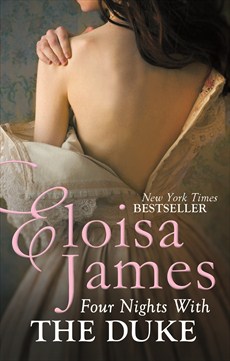
UK Print:
→ As an Amazon Associate I earn from qualifying purchases. I also may use affiliate links elsewhere in my site.


